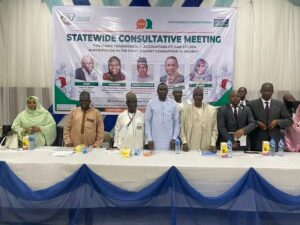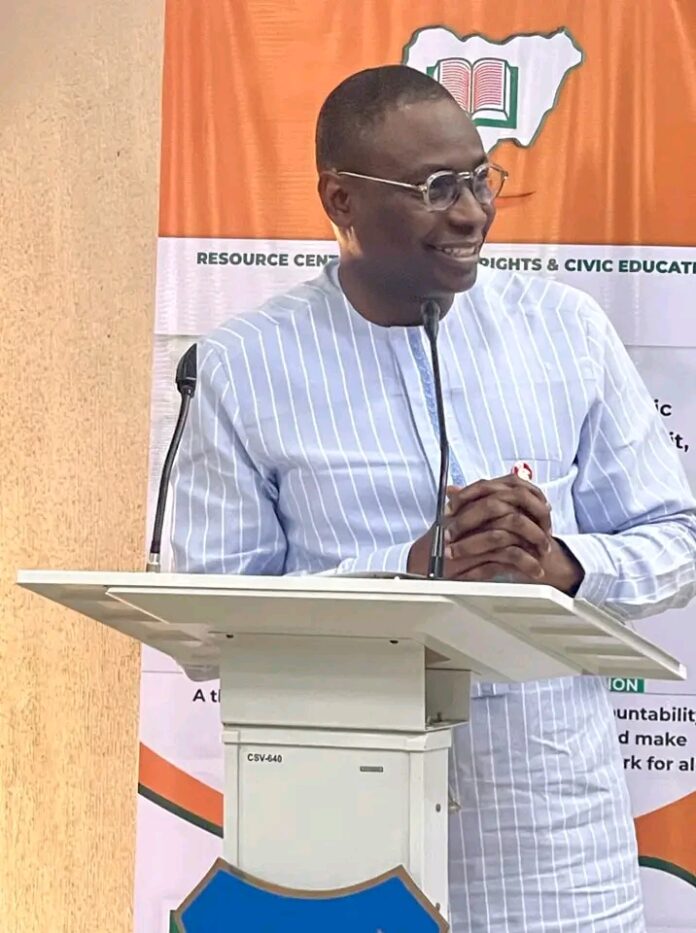The Executive Chairman of the Economic and Financial Crimes Commission, EFCC, Mr. Ola Olukoyede has called on Nigerians across the country to rise up to the task of monitoring constituency projects being embarked upon by their elected leaders in order to drive positive changes and development in their environment s.
He gave the charge in Kano while speaking at a “One -Day Stakeholders’ Consultative Meeting on Fostering Transparency, Accountability and Citizens’ Participation In The Implementation Of Constituency Projects In Nigeria” hosted by the Aminu Kano Centre for Democratic Studies.
According to him, sustainable development can only come when Nigerians take initiatives to interrogate projects being embarked upon by politicians in their respective constituencies.
“We must recognize that true and lasting change comes when communities are empowered to hold their leaders accountable, particularly in the monitoring of constituency projects”, he said.
Speaking on “Imperatives of Community Driven Anti-Corruption Fight: Enhancing Constituency Project Service Delivery in Nigeria” the EFCC boss took both politicians driving the projects and the people to task.
“To this end, he highlighted five crucial areas that will enhance accountable project delivery. They are “ Community Engagement, Transparency in Funding and Execution, Strengthening Oversight Mechanisms, Public Access to Information and Partnership with Anti-Corruption Agencies”.
“There must be deliberate efforts to involve communities in the identification of their priority projects. This ensures that projects are aligned with actual needs rather than being imposed or politically motivated”, he said.
He also stressed that constituency project funds must be fully disclosed to the public and the details of the contractors, timelines, and budgets should be made available for community scrutiny.
“This will not only promote transparency but also give communities the tools to monitor progress effectively”, he said.
He equally stressed the need for availability of public data on constituency projects in order for communities to have easy access to relevant information to help them make informed decisions about the
projects in their areas.
“When communities report discrepancies or suspected cases of corruption, these reports must be promptly investigated. By working together, we can build a feedback loop that ensures prompt action is taken against any corrupt practice”, he said.
Olukoyede explained that corruption remained the bane of development in all sectors of the economy, stressing that it erodes public trust in government.
“Corruption undermines development, erodes public trust, and stifles the very projects designed to uplift communities. Across the country, many Nigerians have voiced concerns about constituency projects that are meant to bring direct benefits to local communities through infrastructure, education, healthcare, and more.
Unfortunately, the impact of corruption has, in some cases, hindered the full potential of these initiatives.”
He reminded Nigerians that fighting economic and financial crimes is a collective responsibility.
To this end, every Nigerian is a stakeholder in the fight against corruption and must see this as an obligation and national assignment.
“As we continue the fight against corruption, we are mindful that this is not just a challenge for institutions but for every Nigerian, every community, and every sector of society.”, he said.
While calling on the public to buy into the anti-corruption campaign, the EFCC boss stressed that with the vast population of Nigeria, public ownership of the anti- graft fight is imperative.
“While the battle against corruption is often associated with anti- corruption and law enforcement agencies like the EFCC, it is crucial to remember that it cannot be won by these bodies alone”.
He particularly charged Nigerians on integrity maintaining that for anyone to be an anti- corruption fighter, a certain level of integrity must be attained.
EFCC




